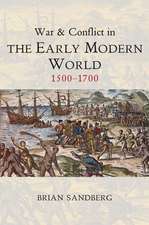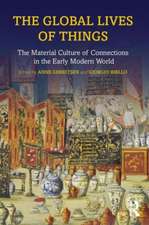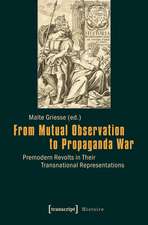Engines of the Imagination: Renaissance Culture and the Rise of the Machine
Autor Jonathan Sawdayen Limba Engleză Hardback – 29 noi 2007
The aesthetic and intellectual dimension of these machines appealed to familiar figures such as Shakespeare, Francis Bacon, Montaigne, and Leonardo da Vinci as well as to a host of lesser known writers and artists in the sixteenth and seventeenth centuries. This intellectual engagement with machines in the European Renaissance gave rise to new attitudes towards gender, work and labour, and even fostered the new sciences of artificial life and reason which would be pursued by figures such as Descartes, Hobbes, and Leibniz in the seventeenth century.
Writers, philosophers and artists had mixed and often conflicting reactions to technology, reflecting a paradoxical attitude between modern progress and traditional values. Underpinning the enthusiastic creation of a machine-driven world, then, were stories of loss and catastrophe. These contradictory attitudes are part of the legacy of the European Renaissance, just as much as the plays of Shakespeare or the poetry of John Milton. And this historical legacy helps to explain many of our own attitudes towards the technology that surrounds us, sustains us, and sometimes perplexes us in the modern world.
| Toate formatele și edițiile | Preț | Express |
|---|---|---|
| Paperback (1) | 377.45 lei 43-57 zile | |
| Taylor & Francis – 29 noi 2007 | 377.45 lei 43-57 zile | |
| Hardback (1) | 1017.21 lei 43-57 zile | |
| Taylor & Francis – 29 noi 2007 | 1017.21 lei 43-57 zile |
Preț: 1017.21 lei
Preț vechi: 1240.50 lei
-18% Nou
Puncte Express: 1526
Preț estimativ în valută:
194.64€ • 203.77$ • 161.05£
194.64€ • 203.77$ • 161.05£
Carte tipărită la comandă
Livrare economică 07-21 aprilie
Preluare comenzi: 021 569.72.76
Specificații
ISBN-13: 9780415350617
ISBN-10: 0415350611
Pagini: 424
Dimensiuni: 156 x 234 x 28 mm
Greutate: 0.94 kg
Ediția:1
Editura: Taylor & Francis
Colecția Routledge
Locul publicării:Oxford, United Kingdom
ISBN-10: 0415350611
Pagini: 424
Dimensiuni: 156 x 234 x 28 mm
Greutate: 0.94 kg
Ediția:1
Editura: Taylor & Francis
Colecția Routledge
Locul publicării:Oxford, United Kingdom
Notă biografică
Jonathan Sawday is Professor of English Studies at the University of Strathclyde, Glasgow. He has taught at universities in Britain, Ireland, and the United States. As well as writing many articles and essays on Renaissance literature and culture, he is the author of the The Body Emblazoned (Routledge, 1995) and co-editor (with Tom Healy) of Literature and the English Civil War (1990), and (with Neil Rhodes) The Renaissance Computer (Routledge, 2000).
Recenzii
"This is a magisterial work of myth-busting, and a marvellous demonstration of how art and literature may be used to reanimate the material imagination of an historical period. The old idea of the Renaissance as a pretechnological pause, or paradise, is gone for good." - Steven Connor, Birkbeck College, University of London, UK
"Jonathan Sawday has written another big, beautiful, brilliant book that will change the way we all see (and hear) the Renaissance." - Gary Taylor, Florida State University, USA
"This is a brilliant achievement… It has huge intellectual and imaginative range and is written with great vitality… This could be the book of the decade in Renaissance Studies."- Neil Rhodes, University of St Andrews, UK
"Jonathan Sawday’s pioneering and thoughtful work can change the course of the study of the Early Modern period… This illuminating book enlarges our sense of the Renaissance, redirects our focus, and shows us a world elsewhere we have not seen before." - Arthur Kinney, University of Massachusetts, Amherst, USA
‘Engines of the Imagination offers a fascinating picture of Renaissance encounters with technology. Engaging and entertaining, Sawday's book will become required reading for all students of the period’. - Mary Poovey, New York University, USA
"While few books can truly lay claim to the achievement of crossing disciplinary boundaries, Sawday’s impressive Engines of the Imagination must certainly be numbered as one of them." - The British Society for Literature and Science
'Jonathan Sawday’s immensely enjoyable and learned Engines of the Imagination is...a careful examination of the literal and figurative function of all manner of ‘engines’ prior to their coding as ‘automatic’, necessarily ‘inorganic’,‘inhuman’machines.' - Julian Yates, The Review of English Studies
"Sawday’s book is consistently engaging, insightful, and suggestive" - Stephen B. Dobranski, Studies in English Literature 1500-1900
'...immensely enjoyable and learned... this is a fine book, written to appeal to 'the great variety of readers', as the phrase goes, or, at least to a greater variety than is sometimes usual. It will be highly useful to advanced undergraduates, graduate students, as well as academic staff. It is also a pleasure to read and a book to which I expect to return.' - Julian Yates, Review of English Studies
'This is a magisterial work of myth-busting, and a marvellous demonstration of how art and literature may be used to reanimate the material imagination of an historical period. The old idea of the Renaissance as a pretechnological pause, or paradise, is gone for good.' – Steven Connor, Birkbeck College, University of London, UK
'Jonathan Sawday has written another big, beautiful, brilliant book that will change the way we all see (and hear) the Renaissance.' – Gary Taylor, Florida State University, USA
'This is a brilliant achievement … It has huge intellectual and imaginative range and is written with great vitality … This could be the book of the decade in Renaissance Studies.' – Neil Rhodes, University of St Andrews, UK
'Jonathan Sawday’s pioneering and thoughtful work can change the course of the study of the Early Modern period … This illuminating book enlarges our sense of the Renaissance, redirects our focus, and shows us a world elsewhere we have not seen before.' – Arthur Kinney, University of Massachusetts, Amherst, USA
'Engines of the Imagination offers a fascinating picture of Renaissance encounters with technology. Engaging and entertaining, Sawday's book will become required reading for all students of the period.' – Mary Poovey, New York University, USA
'While few books can truly lay claim to the achievement of crossing disciplinary boundaries, Sawday’s impressive Engines of the Imagination must certainly be numbered as one of them.' – The British Society for Literature and Science
'...highly useful to advanced undergraduates, graduate students, as well as academic staff. It is also a pleasure to read and a book to which I expect to return.' – Julian Yates, The Review of English Studies
"Sawday's book is consistently engaging, insightful, and suggestive. He carefully grounds his broad cultural analysis with discerning readings of individual texts, and in places he helpfully pursues the implications of his findings by glancing at techology in our modern world."
-- Studies in English Literature, 1500-1900, Vol. 49, No. 2, 2009
"Engines of the Imagination tackles a broad range of material in an imaginative and creative way."
--Michael Edwards, Jesus College, Cambridge, UK
"Jonathan Sawday has written another big, beautiful, brilliant book that will change the way we all see (and hear) the Renaissance." - Gary Taylor, Florida State University, USA
"This is a brilliant achievement… It has huge intellectual and imaginative range and is written with great vitality… This could be the book of the decade in Renaissance Studies."- Neil Rhodes, University of St Andrews, UK
"Jonathan Sawday’s pioneering and thoughtful work can change the course of the study of the Early Modern period… This illuminating book enlarges our sense of the Renaissance, redirects our focus, and shows us a world elsewhere we have not seen before." - Arthur Kinney, University of Massachusetts, Amherst, USA
‘Engines of the Imagination offers a fascinating picture of Renaissance encounters with technology. Engaging and entertaining, Sawday's book will become required reading for all students of the period’. - Mary Poovey, New York University, USA
"While few books can truly lay claim to the achievement of crossing disciplinary boundaries, Sawday’s impressive Engines of the Imagination must certainly be numbered as one of them." - The British Society for Literature and Science
'Jonathan Sawday’s immensely enjoyable and learned Engines of the Imagination is...a careful examination of the literal and figurative function of all manner of ‘engines’ prior to their coding as ‘automatic’, necessarily ‘inorganic’,‘inhuman’machines.' - Julian Yates, The Review of English Studies
"Sawday’s book is consistently engaging, insightful, and suggestive" - Stephen B. Dobranski, Studies in English Literature 1500-1900
'...immensely enjoyable and learned... this is a fine book, written to appeal to 'the great variety of readers', as the phrase goes, or, at least to a greater variety than is sometimes usual. It will be highly useful to advanced undergraduates, graduate students, as well as academic staff. It is also a pleasure to read and a book to which I expect to return.' - Julian Yates, Review of English Studies
'This is a magisterial work of myth-busting, and a marvellous demonstration of how art and literature may be used to reanimate the material imagination of an historical period. The old idea of the Renaissance as a pretechnological pause, or paradise, is gone for good.' – Steven Connor, Birkbeck College, University of London, UK
'Jonathan Sawday has written another big, beautiful, brilliant book that will change the way we all see (and hear) the Renaissance.' – Gary Taylor, Florida State University, USA
'This is a brilliant achievement … It has huge intellectual and imaginative range and is written with great vitality … This could be the book of the decade in Renaissance Studies.' – Neil Rhodes, University of St Andrews, UK
'Jonathan Sawday’s pioneering and thoughtful work can change the course of the study of the Early Modern period … This illuminating book enlarges our sense of the Renaissance, redirects our focus, and shows us a world elsewhere we have not seen before.' – Arthur Kinney, University of Massachusetts, Amherst, USA
'Engines of the Imagination offers a fascinating picture of Renaissance encounters with technology. Engaging and entertaining, Sawday's book will become required reading for all students of the period.' – Mary Poovey, New York University, USA
'While few books can truly lay claim to the achievement of crossing disciplinary boundaries, Sawday’s impressive Engines of the Imagination must certainly be numbered as one of them.' – The British Society for Literature and Science
'...highly useful to advanced undergraduates, graduate students, as well as academic staff. It is also a pleasure to read and a book to which I expect to return.' – Julian Yates, The Review of English Studies
"Sawday's book is consistently engaging, insightful, and suggestive. He carefully grounds his broad cultural analysis with discerning readings of individual texts, and in places he helpfully pursues the implications of his findings by glancing at techology in our modern world."
-- Studies in English Literature, 1500-1900, Vol. 49, No. 2, 2009
"Engines of the Imagination tackles a broad range of material in an imaginative and creative way."
--Michael Edwards, Jesus College, Cambridge, UK
Cuprins
Contents Contents i Epigraphs ii List of Plates iv Preface and Acknowledgments vii
- The Machine in the Margins 1
- Philosophy, Power and Politics in Renaissance Technology 36
- The Turn of the Screw: Machines, Books, and Bodies 91
- Women and Wheels: Gender and the Machine in the Renaissance 172
- ‘Nature Wrought:’ Artifice, Illusion, and Magical Mechanics 226
- Reasoning Engines: The Instrumental Imagination in the 293Seventeenth Century
- Chapter Seven: Milton and the Engine 372
- The Machine Stops 427
Descriere
At what point did machines and technology begin to have an impact on the cultural consciousness and imagination of Europe? How was this reflected through the art and literature of the time? Challenging the artificial divide between technological studies and cultural history, Engines of the Imagination traces the story of the imaginative encounter with machines and machinery in the European Renaissance.
















